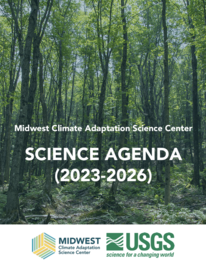Body

The Midwest Climate Adaptation Science Center is proud to share our Science Agenda, which will guide our work and climate science research through 2026.
The Science Agenda was developed through extensive dialogue with our management partners and input from climate experts across our region. During this process, we identified five challenges to the management of natural and cultural resources in the Midwest:
- Heavy precipitation events and drought. Heavy precipitation events, flooding, and drought alter the condition, structure, services, and management of natural resources.
- Loss of winter. Warming winters, altered snow patterns, and increased variability affect fish and wildlife populations, habitat management, subsistence, and nature-based recreation.
- Altered hydrological regimes. Changes in temperature, flows, and connectivity alter highvalue fish populations, at-risk aquatic organisms, and culturally important resources.
- Novel terrestrial landscapes. Shifts in vegetation and human responses to climate change alter the suitability of the landscape for priority and at-risk wildlife populations.
- Barriers to and opportunities for adaptation. Climate change alters the feasibility of management goals and suitability of management tools.
The resultant Midwest CASC Science Agenda outlines these five challenges and 49 strategic science priorities.
Core Concepts
The following ideas underlie all Midwest CASC science priorities and are integral to climate impact and adaptation science:
- Organisms, systems, and institutions may exhibit adaptive capacity and vulnerability assessments are incomplete without this consideration.
- While the direct effects of climate change are widely recognized, the indirect effects pose great threat to natural and cultural resources and require evaluation.
- Adaptation may cause harm (maladaptation) and is recognized as a management intervention with potential downstream effects across systems.
- Multiple ways of knowing, including Traditional Ecological Knowledge, Indigenous knowledges, and traditional knowledge, are honored and valued.
- Diversity, equity, inclusion, and justice are considerations in what, where, and how our science is practiced.
Read the full Science Agenda.
You're also invited to explore the Science Agenda by its themes here.
